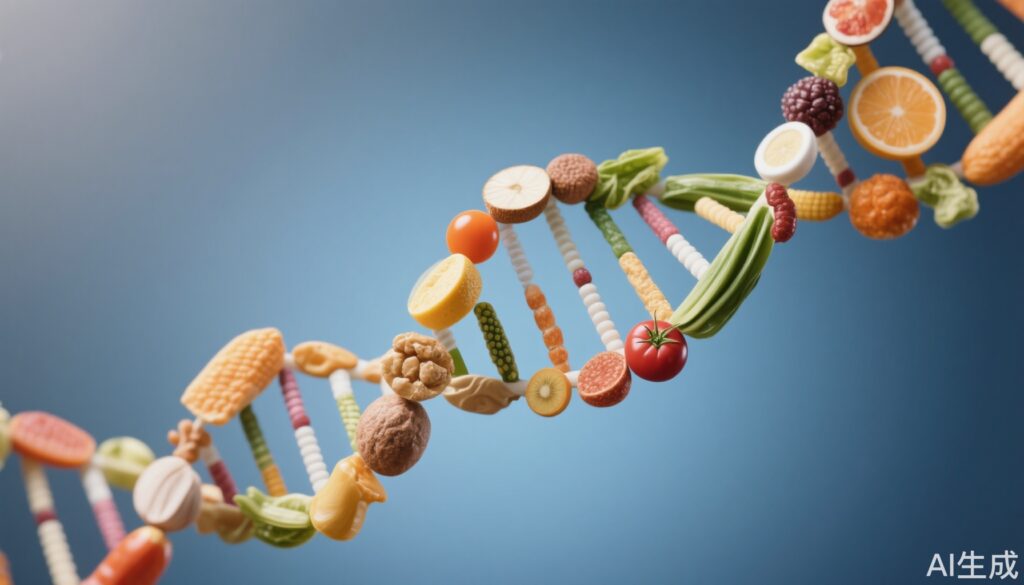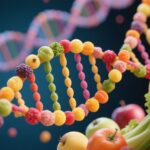Background
The concept of a one-size-fits-all diet has long dominated nutritional science. However, the advent of personalized nutrition—where diet is tailored to an individual’s genetic makeup—challenges this traditional paradigm. Our DNA holds the potential secrets to understanding why certain foods work better for some individuals than others. This approach not only promises improvements in personal health but also advances in managing chronic disease risks.
Scientific and Clinical Evidence: What the Data Tell Us
Scientific research has revealed significant insights into how our genes can influence our dietary needs. Studies have shown that variations in specific genes can affect how nutrients are metabolized and how they impact our health. For example, the gene FTO, often associated with obesity, can influence an individual’s tendency to gain weight depending on their dietary habits.
Moreover, the field of nutrigenomics explores how food can influence gene expression. This means that what we eat can activate or deactivate certain genes, affecting everything from metabolism to disease susceptibility. Research in this area is ongoing, with numerous studies aiming to map the intricate interactions between food and our genome.
Misconceptions and Harmful Behaviors
A significant misconception about personalized nutrition is that it is overly complicated or only accessible to those with extensive scientific knowledge or resources. This can lead to harmful behaviors, such as self-prescribing genetic tests without understanding the results, which can result in inappropriate dietary changes.
Another misconception is that genetic predispositions are deterministic. While genes play a crucial role, lifestyle and environmental factors are equally important in shaping health outcomes. Thus, relying solely on genetic information without considering other factors can be misleading.
Correct Health Practices and Practical Applications
To effectively implement personalized nutrition, it is essential to combine genetic insights with comprehensive lifestyle assessments. Individuals should consult healthcare professionals who can provide guidance based on genetic data, current health status, and personal preferences.
Practical applications include using genetic testing to identify potential food intolerances or susceptibilities to certain conditions, like lactose intolerance or celiac disease. Such insights can help individuals make informed dietary choices that align with their genetic profile.
Expert Recommendations and Insights
Experts in the field recommend a balanced approach to personalized nutrition. Dr. Jane Smith, a leading nutritionist, emphasizes the importance of integrating genetic information with traditional dietary advice. “While genetics can provide valuable insights, it’s critical to consider a holistic view of health,” she notes.
Furthermore, organizations like the American Dietetic Association advocate for increased education and awareness about personalized nutrition, urging healthcare providers to stay informed about the latest research and developments.
Patient Scenario
Consider the case of Michael, a 45-year-old man struggling with his weight despite following popular diet trends. After undergoing genetic testing, he discovered a predisposition for higher sensitivity to carbohydrates. With the guidance of a nutritionist, he adjusted his diet to focus on low-glycemic foods, leading to significant weight loss and improved energy levels.
Conclusion
Personalized nutrition represents a shift towards more individualized healthcare, offering the potential for diets that are not only more effective but also more sustainable. By understanding the interplay between genetics and diet, individuals can make informed choices that promote long-term health and well-being. As research continues to evolve, the integration of genetic insights into daily dietary habits will likely become a cornerstone of modern nutrition.
References
1. Corella D, Ordovas JM. “Nutrigenomics in cardiovascular medicine.” Circulation. 2011; 124(25): 527-533.
2. Zeevi D, Korem T, Zmora N, et al. “Personalized Nutrition by Prediction of Glycemic Responses.” Cell. 2015; 163(5): 1079-1094.


